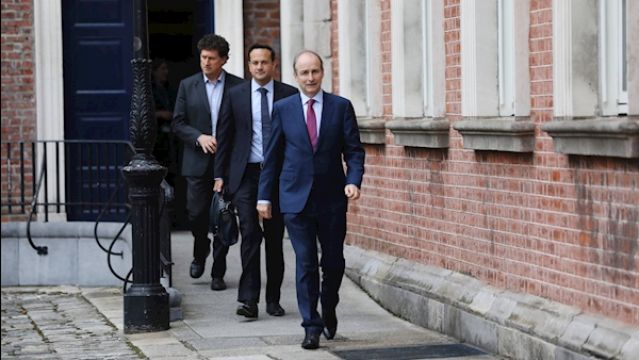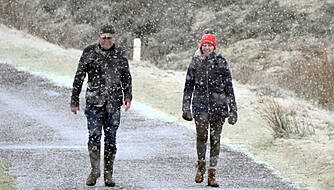The ministers also agreed for Cavan, Monaghan and Donegal to move to Level 4 of the Government’s Living with Covid plan, in place until November 10th.
Under Level 4, no visitors are permitted to homes and indoor gatherings and events are banned. Non-essential retail outlets will have to shut.
A memo brought to the meeting recommended that action was taken amid rising numbers of infections across the country, particularly in the border region.
Tánaiste Leo Varadkar said that “two significant decisions” had been taken by the Cabinet.
He said a lot, if not most, Covid transmission is happening in private homes.
“All those things have to stop because if they don’t stop the virus can’t be stopped. And that’s what we’re asking people to do,” he said.
The move comes after the Stormont Executive agreed to bring in four weeks of increased restrictions in the North in an effort to arrest the growth of the virus.
Taoiseach Micheál Martin welcomed the additional measures announced in Northern Ireland.
“The data coming out of the North is hugely worrying,” he said.
“We will continue to engage with the Northern Executive in the coming days to discuss the situation, and the need for continued North-South co-operation and co-ordination. As we have said before, the virus pays no heed to borders.”
There were 1,095 new cases and five further deaths reported in the State by the National Public Health Emergency team (Nphet) on Wednesday – the highest single number reported on one day.
The national 14-day incidence rate of the disease per 100,000 is 190.7, according to Nphet. The highest rates are in Cavan at 571 per 100,000, Monaghan at 360 per 100,000, and Donegal at 353.7 per 100,000.
The Derry and Strabane Council area, which has been experiencing the highest infection rate in the UK and Ireland, now has a seven-day average of 992 cases per 100,000 people. The 14-day incidence rate in Derry and Strabane is 1,754 cases per 100,000 people.
cAYD5
Nphet is due to meet on Thursday to discuss whether Level 3 restrictions have done enough to curb the spread of the virus, or whether a recommendation of increased measures is needed.
Responding to the high number of new cases, the chief medical officer, Dr Tony Holohan, said the situation was “extremely concerning”.
“We each need to reduce contact with other people as much as possible, so that means staying at home, working from home where possible, practising physical distancing and stopping discretionary socialising,” he said.
JtuZF
Irish College of General Practitioners’ clinical lead on Covid-19, Dr Mary Favier, said it was inevitable the Government would have to introduce further restrictions to tackle the virus.
Speaking on RTÉ radio's Morning Ireland, Dr Favier said more needs to be done as the virus doubles each week there was an inevitable "knock-on" impact on services.
People had to change their behaviour or further restrictions will be required, there was now very little time to decide that, she said.
Further restrictions for three to four weeks would have an impact on numbers, Dr Favier said, adding that people would accept this if they knew the end was in sight.
Dr Favier pointed out that the public had responded with drama and put their shoulder to the wheel back in April, they needed to do that again. Employers needed to allow staff work from home where possible, adding that there should be no unnecessary travel and people should meet outdoors.
GPs had been seeing a rise in numbers in the last few weeks and this was having an impact on services. While there had been some levelling off in Dublin under Level 3, it was not enough and there was growing pressure on GPs and on hospitals, she said.
“The system is under pressure from the sheer numbers. We need to do something different.”
The solution was in the public’s hands, it was in everyone’s behaviour. There were too many people meeting, she said.
The Republic was only two to three weeks behind Northern Ireland’s rates, she warned. – Additional reporting: Vivienne Clarke







